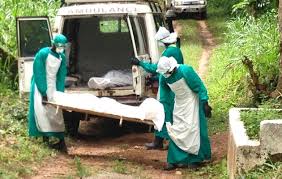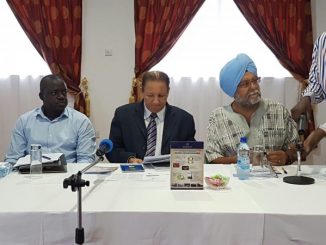
MANY MORE WILL HAVE TO SUFFER, MANY MORE WILL HAVE TO DIE
Strategic Media & Development Communications Unit
The Ebola crisis is yet to turn its ugly head away from Sierra Leone. There is a sinister inevitability that deaths of the citizenry has to be contended with and the leadership seem to have no secure guarantee that such wanton loss of life can be averted. As Bob Marley said in his song, Natural Mystic, “many more will have to suffer, many more will have to die, don’t ask me why?”
The scourge of the virus and its characteristic Hemorrhagic fever known as the Ebola Virus Disease (EVD) has taken the West African sub-region by surprise. In Guinea, Sierra Leone and Liberia, people are dying by the second, with no apparent cure nor treatment known to substantially reduce the death rate of sufferers nor increase survival rate. In a way, the deaths attributed to Ebola under conditions of the debilitating poverty of our rural communities in Sierra Leone Liberia and Guinea further mystifies the killer virus. Why are so many dying of this dreadful scourge that in itself have a relatively short shelf life beats the imagination of many a health practitioner and social worker.
Weak health systems and infrastructure have been the primary target of the spread of this virus amongst these communities that have suffered the most. However, it is now evident that preparedness to fight this virus is a more potent weapon than even the best of health care delivery systems. Spain and the United States of America have had their own manifestation of the virus. The virus having transferred from one patient to another under the watch of their respective health systems makes a statement of laxed preparedness than one of capacity or indeed capability. To say their health system is not up to standard would have been folly. The truth is that these countries have very high quality health care but that in itself was not enough to keep the virus out due to its personal nature of spread and the fact that the exchange of bodily fluids, the very vehicle of its transfer from one patient to another is something that happens with such alacrity in a health care setting that the prospect of being caught off guard becomes a calculable one.
The World Health Organization has accepted that as an institution, it underrated the efficacy of the virus to move with such rapidity across the sub-region. Their initial assessment was for a three month exercise that would be burnt out by deployment of experts and technical personnel to deal with its manifestations. What they did not take into account was the period during which the scourge remained unheeded, thereby killing off scores of people in Kailahun and neighboring areas in Guinea and Liberia where the usual Luma or community market was a celebrated showcase. In that arena, the crowds and interaction that is the normal order of business became fertile ground for cross contamination. The social arrangements in this tri-country zone presents a viable area of engagement for the virus and on proper examination would cast very serious doubts on the theory of a single source introducing the virus to respective countries after its origin in Guinea, supposedly via fruits or bush meat. The celebrations of life and death in our cultures play a significant part in the resilience of the virus. It has manifested itself as a part of our ceremonies, embed itself in our greetings, our handshakes, our care for the sick and dying and even for our yearning to provide a befitting tribute to honor our dead.
With such closeness, it is no wonder that the virus has been so easy to permeate our societies, simply because even in our arrangements of social engagements, we are a stubborn people, hard put to let go of our values, norms and traditions
It is against this background that the epidemiology of the virus should be situated. The reluctance to forego customs and long held traditions manifests itself in a variety of ways until it comes round to a mundane application of rent seeking in the process of demanding regime change on cultural practices and customs. There is now the case of bribes being offered and taken to alter death certificates, provide false or fake death certificates or otherwise indicate wrong cause of death on certificates, all the more to have the freedom to treat the corpse of a loved one in a humane manner rather than to leave such cadavers to be buried in mass graves or unmarked plots to which no annual pilgrimage can be made. The continuity of relationships with our dead is subsequently one significant factor that fuels such rent seeking and a practice justified on account of the way the EVD dehumanizes our dead.
The central argument of how many more will have to suffer and how many more will have to die pivots on the principle of preparedness. As the virus enters and establishes itself in the capital city of Freetown, two things would necessarily happen. Firstly this is where the virus would play its end game and expound all its ramifications for Sierra Leone. It is here that the threat of an Ebola economy becomes a reality with the full gamut of active players, carpetbaggers and epidemic entrepreneurs. Secondly, the impact of the virus on the population would be expanded in a geometric proportion relative to the inter-connectedness of relationships in this place. The maxim that “inside this city, we all are mates,” would play out its full and rancorous repercussion with a scale of infection far removed from the expectations of most knowledgeable watchers. The issue of preparedness is therefore critical to any effort at resisting such growth explosion of the virus in the city of Freetown.
The experience of the recent past has been one of which particular officials may in themselves become overwhelmed for the very reason that they withhold and reserve power and authority to act to themselves and a few of their cronies. Consequently, the disenfranchisement of those more able to assist in eradicating the scourge rebounds on them and the prospect of unwarranted deaths that would result become much more real. Such an occurrence must be dissipated by effective counter measures now and that may be the crowning glory of the newly constituted National Ebola Response Council (NERC).
The central questions therefore of how many more will suffer and how many more will die rest squarely on how fast the NERC gets to work. To allocate resources in such a manner that the Freetown City Council is empowered to act; how the NGOs, and in this case, priority to be given to the indigenous NGOs will support the efforts of the NERC through targeted project delivery, and overall for a communications strategy that embeds various themes of communication in creating the right messages. The earlier attempt to outsource communications to a single body or institution necessarily backfired because this is one time when duplication of effort is a good thing. If everybody is saying the same things differently, then the core messages are bound to get through and take effect. The NERC’s timing is a masterstroke and its effectiveness will evidentially vindicate President Koroma’s deep vision for cancelling the nefarious effects of this scourge on Sierra Leone.




Leave a Reply